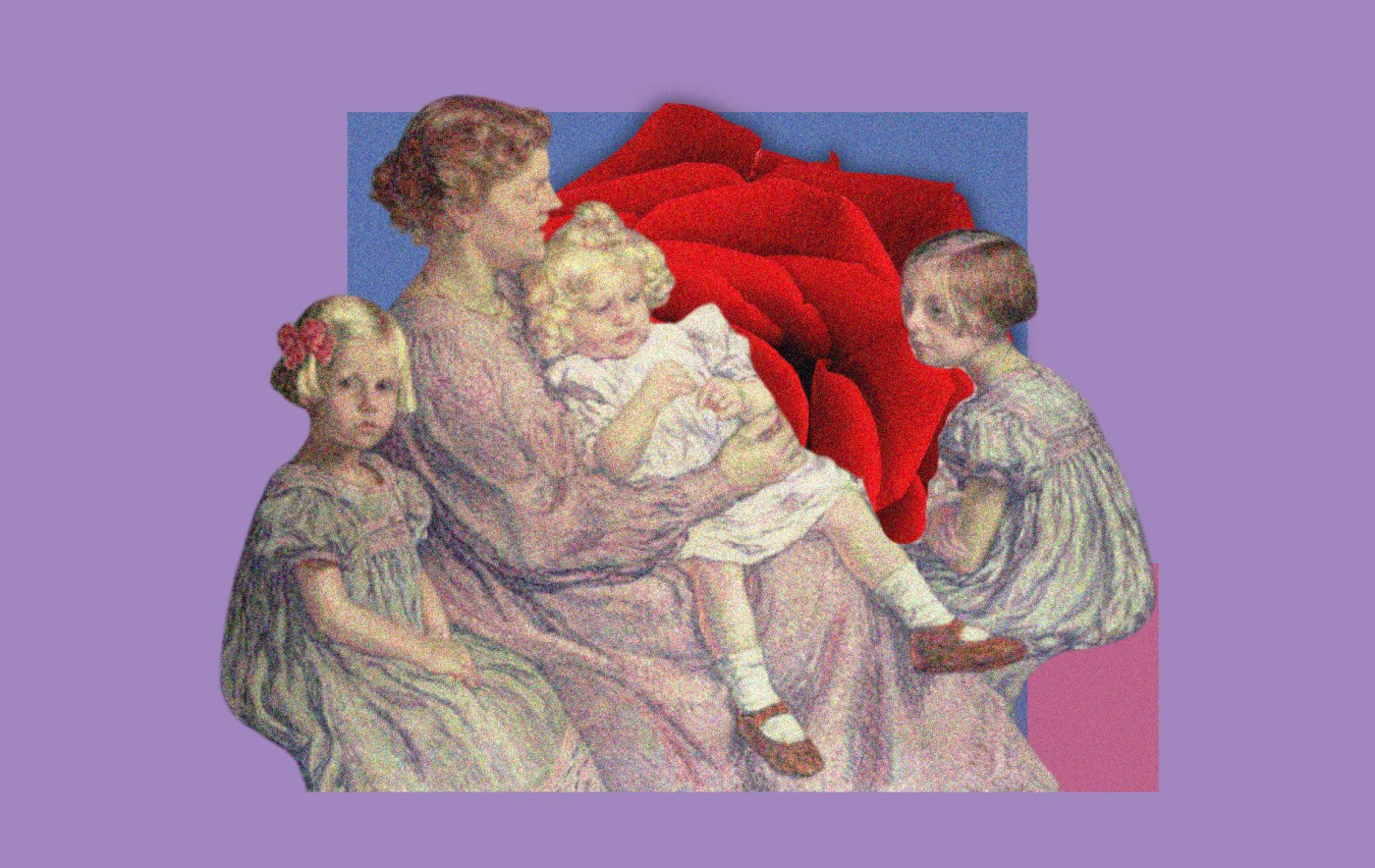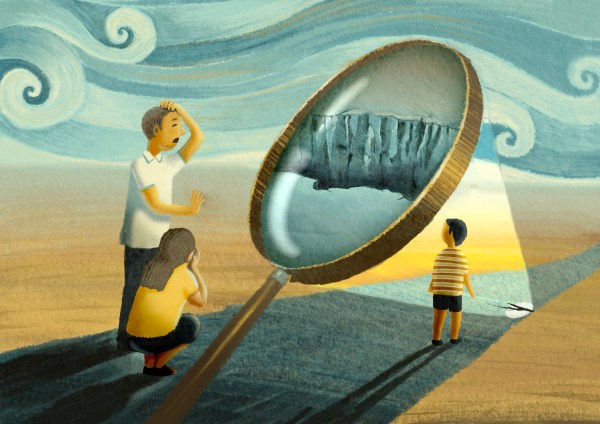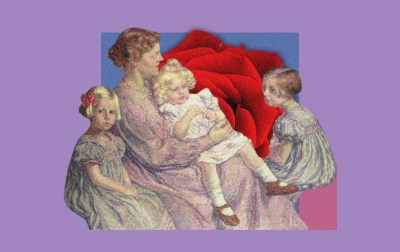Many mothers have, at some point or another, had the experience of mentioning to someone that they have children—and then watching that person begin to scan the room for someone else to talk to. I’ve experienced this, and, anecdotally, so have most of my friends. There are some childless people who simply think that having children is irrational or harmful to the environment. But often, it’s subtler than that: Most people don’t think that motherhood is “bad.” They just consider it to be low status.
The motherhood I’m referring to specifically is the hands-on child care—the kind we often think of as drudgery—that is most intense in the early years of a child’s life. It’s technically not restricted to mothers, though it is mothers who most often engage in this type of work, not least because of obvious biological reasons. But theoretically, the status framework applies to anyone who is a primary caregiver. A stay-at-home dad of three kids under the age of 5, for instance, would be lower status than a mother of teenage children who’s gone back to work full time. A childless day care teacher, by the same logic, is more low-status—relegated to the uninteresting work of constantly changing diapers and singing nursery rhymes—than the two working parents whose kids she looks after. In this framework, caring for children lowers status, and engaging in what is considered more productive economic work raises it.
Here in the U.K., public policy reinforces the cultural stereotype of the unproductive full-time parent. In England specifically, our government currently subsidizes child care under specific conditions: Parents can get 15 hours of free child care from 9 months to 2 years old, and 30 hours from 3 to 4 years old. The caveat is, both parents must be employed and must be earning at least the equivalent of 16 hours a week each at minimum wage. If one parent decides to stay at home full-time—or to work very reduced hours while the child or children are small—then the family can get only 15 hours of child care a week maximum, and only from the age of 3. The kind of more flexible babysitting arrangements that many mothers would prefer as an alternative to day care is not feasible under this scheme.
But why does this matter, and what does it reveal about our attitudes toward mothers and children? First of all, it confirms that we value participation in the labor market more than the formation of flourishing families. There’s no understanding here that mothers contribute to the economy simply by raising the men and women who will one day pay for our pensions. We focus overly on current economic production, completely neglecting the long-term payoff of the work of mothering.
But this type of child care funding doesn’t only force parents—especially mothers—back into the workplace. It also assumes that unpaid child care isn’t “actual” work, and therefore that primary caregivers don’t need a break. No child care at all would be funded, for example, for a stay-at-home mother of two kids under three who may want part-time child care for her toddler while she adjusts to caring for her new baby.
The message that such a scheme sends to British mothers is clear: “It’s best if you go back to work, so if you insist on staying at home with your children, you’ll get no help from the state.” On the one hand, motherhood is seen as replaceable, unqualified work, undistinguishable from any low-skill, minimum wage job. Especially if a woman was in a highly-skilled, highly-paid profession prior to having children, the assumption is that it would be a waste not to return to work as soon as possible. On the other, if you do choose to be the primary caregiver for your children, then you must do it all the time. It’s inane, mindless work, so there’s no reason why you should need any help with it, right?
In the last few years, the dysfunctionality of this system has started to show, and backlash has emerged and thrived. Many conservative commentators both here in the U.K. and in the U.S. have rightly reacted against the culture of the so-called “day care generation,” calling for a return of stay-at-home motherhood as more beneficial to mothers, fathers, and children alike. The online tradwife movement has gained significant traction, with its idyllic promise of daily homemade sourdough bread and giggling children running barefoot in flowery meadows. Elon Musk and other Silicon Valley types, whom I like to call “pronatalist technophiles,” have been advocating for higher birth rates. Experts in the social sciences, like the increasingly popular psychoanalyst and parent coach Erica Komisar, keep warning us about the damage that selfishly career-driven parents (mothers in particular) wreak on their children.
Does all of this mean that being a mom is finally rising in status, after decades of women being told that their worth was tied to their jobs, not their kids?
The answer is a very complex one, but overall, I would say no. Yes, there’s undeniably been a push for motherhood (or at least, for procreation) to be considered more high status, which in turn could legitimize the work of stay-at-home moms. But this hasn’t come without its costs. Tradwives, in theory, encourage women to give themselves permission to stay at home when their children are young, emphasizing that full-time mothers aren’t lazy, but instead hard-working and invaluable, which is absolutely true. However, as I’ve recently argued for Fairer Disputations, a journal that engages with feminist issues from a sex-realist standpoint, in practice most large tradwife accounts are run by well-off women who prioritize aesthetics and engagement farming, and set unrealistic standards for what full-time parenting should look like. Not to mention the irony that many of them also make their traditional lifestyle untraditional by turning their social media presence into a job.
Similarly, it may seem desirable to have Elon Musk and other tech bros as allies. But, as the New Statesman argued last year, their brand of pro-natalism has all to do with fixing falling birth rates and thus saving civilization (noble goals as they may be), and little to do with the well-being of the mothers and children in question. Tech pronatalism also often veers close to eugenics; it doesn’t simply advocate for more children, but specifically for genetically optimal children—in some cases to the point of encouraging right-wing people to reproduce at such a rate as to outnumber liberals. Pronatalism, in the absence of any concept of human dignity, can very quickly devolve into seeing women as interchangeable gestators, which in turn diminishes the beauty and dignity of a woman’s motherhood.
From this perspective, motherhood is not relational, but utilitarian: It’s all about making more babies. Technophilic pronatalism doesn’t primarily care about the unique bond between a mother and her child (even less about the father’s bond with the child)—but rather about getting women to give birth more often. As the writer Helen Roy recently argued, this is precisely the kind of pronatalism that can devolve into what she insightfully calls “fertility idolatry.” For religious people, this would mean that “any woman who falls short of [this] ideal essentially ceases to bear the image of God. ‘Complete womanhood’—and even salvation, to the evangelical types—is reduced to one criterion: childbearing.” In more secular terms, the status of a woman, by this logic, rises to its peak in her most fertile years, but then dips as she can no longer bear children; it’s but a temporary form of social currency. If not rooted in the belief that the human person is inherently valuable, it is no different from the market participation mentality: It still revolves around the production of goods, except in this case the goods in question are children.
Finally, what should we make of the anti-day-care trend? Komisar has rightly brought attention to the fact that the day care system is deeply flawed. I wholeheartedly agree with her that a 6-week-old baby should not be in day care all day, five days a week. I agree that companies shouldn’t support this kind of alarmingly premature separation of a child from its mother by sponsoring day care for female employees to urge them back to work. I think she’s perfectly reasonable in suggesting that mothers with the option to do so should seek professions like a home-based baking business or remote counselling rather than corporate jobs.
However, in the pursuit of maximizing children’s well-being, Komisar—and others like her—often neglects the personhood of the mother. Yes, she attaches extremely high status to the job of mothering, especially in the first three years of a child’s life. But, in interviews and media appearances, she also routinely encourages mothers to listen to their sense of guilt if they resort to compromises such as any kind of sleep training (especially under one) or any kind of daycare at all for children under three.
The bottom line, it seems, is that parenthood is tough and exhausting, but since you chose it, you should be prepared to do it as selflessly as possible—with little thought to how selflessness in excess can be just as damaging as its opposite. While I wholeheartedly agree with many of Komisar’s concerns and suggestions, I remain skeptical that this rhetoric of guilt is a healthy or effective way to foster a better view of motherhood.
Tradwives and Silicon Valley pro-natalists want more kids. Pro-natalists and day care skeptics want better kids. Day care skeptics and tradwives want kids at home with their moms. They’re all playing their own game, but mothers never win. And in fact they’re only in the game as pieces, not players. What could be more low-status than that?
Where do we go from here? Firstly, we should advocate for better public family policy—such as more flexible maternity and paternity leave—to allow mothers to be more present in their children’s early years, and this cannot be done unless motherhood is seen as a high-status vocation in the eyes of the law and state. Some countries do this, to some extent: For example, Article 41 of the Irish constitution rightly “guarantees to protect the Family” and ensure that mothers are not “obliged by economic necessity” to work, on the grounds that it “recognises that by her life within the home, woman gives to the State a support without which the common good cannot be achieved.” Similarly, the Italian constitution states that “working conditions must allow women to fulfill their essential role in the family and ensure appropriate protection for the mother and child.”
Even so, we need to remain wary of how we think of social status. It shouldn’t be the case that “mothers” or “children” as separate persons are seen as having higher status than others. Rather, it’s motherhood itself, that is, the bond between mother and child, that should be regarded as essential to both the family and society more broadly, and therefore worthy of being protected and supported.
Whenever we fail to regard the interests of the mother and her child as an inseparable unit, then status becomes a zero-sum game where the mother’s win is the child’s loss, and vice versa. Contemporary forms of feminism have been correctly criticized for overemphasizing the well-being of mothers (and women more broadly) over that of children. However, the reactionary examples I cite above overcorrect this mistake in their individual ways. Day care skeptics of the Komisar school focus on the well-being of the child and on the necessity of sacrifice on the mother’s part, sometimes to the point of suppressing the very real needs of the mother. Tech pronatalism neglects the bond between mother and child altogether by encouraging procreation in the absence of any solid concept of motherhood, to the point of promoting artificial reproductive technologies, such as surrogacy, which physically enact this separation of mother and child.
I turn to the enduring advice of British pediatrician D.W. Winnicott, famous for his concept of the “ordinary devoted mother” or the “good enough parent,” to end on a hopeful note. In his book The Child, The Family, and the Outside World, Winnicott warns new mothers not to try and “mould” their babies, nor to “feel responsible for the result.” Motherhood is not about maximizing the psychological or genetic potential of your child, nor is it about mothers competing with each other over who has sacrificed more and should thus receive more praise and admiration. It’s about the bond of devotion between an ordinary woman and her ordinary child—a bond that, if strong, will strengthen society in turn. Our job as a society is to figure out how to best protect that bond.






Please note that we at The Dispatch hold ourselves, our work, and our commenters to a higher standard than other places on the internet. We welcome comments that foster genuine debate or discussion—including comments critical of us or our work—but responses that include ad hominem attacks on fellow Dispatch members or are intended to stoke fear and anger may be moderated.
With your membership, you only have the ability to comment on The Morning Dispatch articles. Consider upgrading to join the conversation everywhere.